Peter MALONE
Saturday, 18 September 2021 19:51
Love Bug, The/ 1997
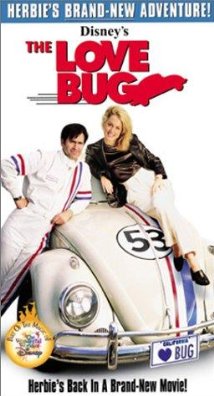
THE LOVE BUG
US, 1997, 88 minutes, Colour.
Bruce Campbell, John Hannah, Dean Jones, Alexandra Wentworth, Kevin J.O' Connor, Dana Gould, Harold Gould, Mickey Dolenz, Burton Gilliam, Clarence Williams III.
Directed by Peyton Reed
The Love Bug is something of a remake of the original Disney film of 1968, a great hit and a family classic. It is the story of a small Volkswagen who has extraordinary powers – explained in this film by the work of a German scientist who was brought to America after World War II and commissioned to make a special car. He did so, but secretly, with a special ingredient, a framed photo of his beloved wife falling into the mix, and endowing the Volkswagen with personal characteristics and powers.
As this telemovie opens, Herbie is being driven by a callow wealthy driver, played with over the top disdain by John Hannah. Herbie is discarded but is the only car left in the competition for who is the best mechanic. Hank Cooper is a former driver who is about to be fired his boss, Clarence Williams, but is given the opportunity to work on Herbie who responds well and wins the competition.
This raises the ire of affluent Simon whose fawning associate, Rupert, tracks down the inventor who is commissioned to make a new car – which, as we all know, will have a photo of Simon himself, giving the black Volkswagen a demonic character. We also know that there will be a final race between the two and that Simon will lose – to the rival he looked down on, Hank, his assistant and carer for Herbie, Roddy, and his past love, and now a journalist, Alex.
While John Hannah is the sneering villain, Bruce Campbell, best known for the Evil Dead films, rather lacks charisma as the hero driver. Alexandra Wentworth is the journalist.
Memories of her former driver, Jim, means that they look him up, giving Dean Jones the possibility for a pleasant cameo role.
1. The popularity of The Love Bug and its several sequels? In the 1960s and 1970s?
2. This film a version for the 1990s? More modern times, upbeat, stronger cars, more competitiveness?
3. The American settings, driving arenas, garages, the arts show, the highways in the race? The special effects for the race, stunts for Herbie? For Horace? The musical score?
4. The imagination with Herbie, a car with personal powers? Signalling with lights and sounds, computed communicating is attitudes?
5. Simon, the villain, losing the race in Herbie, his anger, Rupert as his assistant, treating him badly, Rupert and his fawning attitude, his seeing Herbie’s performance, wanting to find out, going to the art exhibition, stealing the key, Rupert finding the inventor, the meeting and discussion, commissioning the car, Rupert bringing his portrait to put in the mix, the key, the emergence of Horace?
6. Hank, former driver, falling out with Alex, her talking about cars all the time, his wanting something more? His manager threatening to fire him? Roddy and his enthusiasm? The competition, his getting Herbie, working on Herbie, the wheelies and the performance and his winning, everyone coming to get work done at the garage?
7. Hank, lacking in personality, teaming up again with Alex, the misunderstandings, falling out? Roddy and his affection for Herbie, explaining it to Hank?
8. The challenge, Simon wanting to win, the bet and the taking over of the other car by the winner? The team working to prepare Herbie?
9. The race, the rivalries, Simon and his modifications, the screw and the flat tyre, the grenades, the finale and cutting Herbie in half?
10. The group’s decision to go on, the cutting of Herbie in half, Roddy crossing the line first, Horace going through the two parts, down into the dam, the
explosion – and the police arresting Simon for misdemeanours?
11. And happy ending for everyone else?
Published in Movie Reviews
Published in
Movie Reviews
Tagged under
Saturday, 18 September 2021 19:51
Hired Gun, The
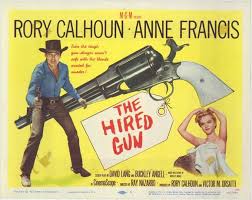
THE HIRED GUN
US, 1957, 63 minutes, Black and white.
Rory Calhoun, Anne Francis, Vince Edwards, Chuck Conners, Robert Burton, John Litel, Guinn Williams.
Directed by Ray Nazarro.
The Hired Gun is a brief western, in Cinemascope and black-and-white, supporting feature from 1957. It is a standard story except for a woman about to be hanged for murder. She is played by Anne Francis – and is innocent. sSe is rescued from jail by a worker on her four uncle’s ranch, Chuck Conners. Her father-in-law employs a gunfighter to bring her back from New Mexico to Texas for justice, believing her guilty of killing his son.
Rory Calhoun who produced the film plays the gunfighter, Vince Edwards is the villain. Two veterans from the 1930s and 40s appearing (naturally) older are John Litel as the ranch owner and Guinn Williams as Kirby, the drunken alibi for the villain.
1. A small western, brisk, justice issues, a woman to be hanged?
2. Black-and-white photography, locations, mountains and rocks, Cinemascope style?
3. The opening narration from Ellen, the town, quiet, the jail, the noose, she being about to be hanged?
4. Judd disguised as a preacher, the jail, escaping with Ellen? Beldon, his son Kell, the posse, the planned escape, the two men in the wagon, abandoned, their story, Judd and Ellen escaping, arriving back home? Her uncle and his support? Her working with cattle, Judd’s approach, Ellen having no feelings for him, his aggressive response?
5. Beldon, urged on by his son, finding Mc Cord, the deal, the money?
6. Mc Cord, gunfighter, coming to the Conroy Ranch, getting work, with the cattle, meeting Ellen, saving her from Judd, taking her?
7. The journey, the dangers, Judd and his pursuit, Mc Cord disarming them, Judd being wounded?
8. Mc Cord doing his duty, not believing Ellen, gradually listening to her story, the flashback and the dance, her wanting to leave her drunken husband, Kell and his dislike of his brother, the father not believing this, the fight, Kell shooting his brother, Kirby as his witness? Their both lying in the court?
9. Mc Cord delivering Ellen, the jail, hiding her with his friend Ortega, Kell pursuing them, the confrontation and his death? Mc Cord getting the writ from the judge, Ellen’s innocence, Beldon and his disillusionment with his son?
10. Kirby, his presence at the killing, his perjury, Mc Cord finding him, questioning him, the leather and water torture persuading him to tell the truth? his accompanying Mc Cord to the sheriff?
11. Justice done, and happy ending?
Published in Movie Reviews
Published in
Movie Reviews
Tagged under
Saturday, 18 September 2021 19:51
Beyond Outrage
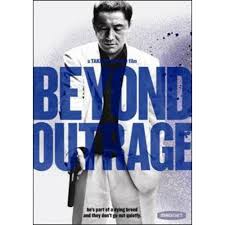
BEYOND OUTRAGE
Japan, 2012, 112 minutes, Colour.
Directed by Takeshi Kitano.
Beyond Outrage is a sequel to the 2010 film, Outrage, both films directed by Takeshi Kitano and starring him as a hit-man gangster.
The original film showed complexities in the structures of the Yakuza and the consequent violence in the struggles for power as well as for control of drugs and other crime outlets to make money. There was a lot of violence in the film, some of it quite over-the-top.
The plot for this film takes place five years later.
It requires quite some concentration to follow the details and intricacies of the plotting, struggles, violence, murders that are part of this scenario. For non-Japanese and for audiences not familiar with Japanese gangster films, they are very complicated, audiences trying to identify particular characters, trying to follow the double-dealing and betrayals. The Sanno clan has built up its superiority over other Yakuza organisations. But, it is open to manipulation, double-dealing and betrayal. There is also the complexity of the role of the police, the corrupt detective from the first films still wielding some influence, yet some upright police trying to make sense of what is happening.
Takeshi Kitano began his directing career in the 1980s and 1990s with films about gangsters and the police, the struggles with the Yakuza. Since then, he has directed a wider range of films, but always returning to the gangster genre. He played a significant role in Outrage, is now found to be in prison at the beginning of this film, is moved to quick release, and begins his hit-man activities with a violent stances and tactics.
Expertly made, but one for those in the know and fans of the genre.
Published in Movie Reviews
Published in
Movie Reviews
Tagged under
Saturday, 18 September 2021 19:51
Wallander: An Event in Autumn
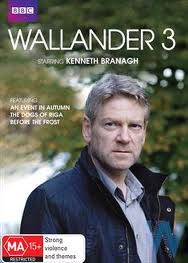
WALLANDER: AN EVENT IN AUTUMN
UK/Sweden, 2012, 90 minutes, Colour.
Kenneth Branagh, Saskia Reeves, Richard Mc Cabe, Sarah Smart, Donald Sumpter.
Directed by Toby Haynes.
This is the second film in the third series (each of three) with Kenneth Branagh as Wallander. He is getting older, more than a touch more cynical, yet still committed to solving cases in his town of Eystad. While the Dogs of Riga sent him to Estonia, this story has a Polish connection.
1. Audience interest in Wallander? The knowledge that novels of Hening Mankel? The series? The presence of Kenneth Branagh, his development of the character over the series? Very British, yet Swedish? His age, experience, becoming more morose? His commitment to his work?
2. The development in this story, his living with a partner? The background of his past relationship with his daughter, his career? His partner and her child? The life of the house? His really not being suited to it?
3. Ysted, the city, the police precinct, the offices, the countryside, the country house, the grounds, neighbours? The ferry, wharves? Poland? The detail? The musical score?
4. The story of the ferry, the decks and the fall, CCT, identifying the victim? The captain, his research? The other girl giving information? The issue of the necklace? Prostitution, the father and the money, the sadness of Eastern Europe? The murder of the victim’s friend?
5. Wallander, relationships, the effect on him, the character of Vanja, her love, her child? The impossibility of the relationship continuing?
6. The discovery of the skeleton, the further investigations?
7. Wallander going to visit Frederick, his being elderly, his life, talking with Vanja, the suggestion about the previous owner, the pump, the disappearance of the daughter?
8. The dead girl, her friend, the motives for their murder?
9. The daughter, abroad, sending information, her visit, giving the lead?
10. Wallander, returning to confront Frederick, the danger? The complexities of the plot and the motivations and malice?
Published in Movie Reviews
Published in
Movie Reviews
Tagged under
Saturday, 18 September 2021 19:51
Admission
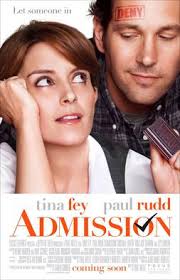
ADMISSION
US, 2013, 107 minutes, Colour.
Tina Fey, Paul Rudd, Lily Tomlin, Michael Sheen, Wallace Shawn, Gloria Reuben.
Directed by Paul Weitz.
Admission looks as if it should be a comedy, especially with Tina Fey, so adept at impersonations and comic timing – she was the perfect Sarah Palin on television during the 2008 American elections. And Paul Rudd has done his fair share of comedies. So has Lily Tomlin.
However, there are serious themes in Admission. Tina Fey portrays an official of the Admissions Board for Princeton University, New Jersey. Paul Rudd plays a wealthy young man who has travelled the world, supporting all kind of developments and buildings. He now runs a specialist school in New England and is eager for his star student, Jeremiah, Nat Wolff, who he thinks is the adopted son of Tina Fey.
Admissions certainly has some funny moments, but Tina Fey is being abandoned by her partner of 10 years, Michael Sheen, gets tangled in trying to help Jeremiah to get into Princeton, which leads her into conflict with the authorities at the University. She also has some tangles with her eccentric mother, Lily Tomlin. It all comes to a rather serious crisis which means that she has to re-examine her life.
The film is directed by Paul Weitz, a director of various films ranging from American Pie, About a Boy, and The Golden Compass.
1. The various meanings of the title: group considering admissions to college, admittance and no admittance, admitting realities? Each theme present in this film?
2. The cast, the background comedy, comic aspects, serious aspects?
3. New Jersey, Princeton, schools in New England? Campus, offices? Homes? The musical score?
4. The focus on Portia, her mother’s choice of the name? Her relationship with Mark, 10 years, settled, relying on him? The work, 16 years? Her
personality, quirky? The rivalry with Corinne? Her friendship with the director? Her methods for admissions, the interviews, the essays, her being behind in reading them? The director and his expectations? The clashes with Corinne? The other members of the board?
5. John, his application, knowing Portia in the past, his life, wealthy family, his travel, many countries, building, an idealist? His adopting Nelson? His life, setting up the school, the range of students, the curriculum? The invitation to Portia? Her coming, moving her lips and mouth to speak well, the session, the students reactions, her being put off? Chasing her with a document, her embarrassment, reaction, that Jeremiah could be her son? Meeting Jeremiah, observing him?
6. Nelson and his father, African, not wanting to travel more and John’s reaction? His liking Portia? His birthday party?
7. The visits to her mother, her mother’s eccentricities, relationship with her daughter, the background story of her conception, not knowing the father’s identity? Her mother as a hard case, not giving information about her surgery? The new breasts?
8. Jeremiah arriving at Princeton, her promise that he would be accepted, going to the dormitory, his serious attitudes, talking at the party? Portia turning up, her concern about him? Giving him more leeway?
9. The encounters with John, his kiss? Her relationship with Mark, ten years, his duplicity, leaving, his girlfriend having twins? His callow attitudes, seeing her in passing, trying to relate to Portia? Mark his girlfriend and her antagonism?
10. Her moods, up and down, trying to cope with the news about Jeremiah, researching, it seeming certain?
11. The celebrity Professor, his admiration for her mother, the relationship, her request that he come to see Jeremiah, write a positive letter?
12. The fair, the birthday, Jeremiah as ventriloquist? The professor being impressed? Staying the night with her mother?
13. The meeting of the board, the admissions, Portia and her talking in a friendly way with each of the members of the board, blocking the hostility with Corrine, the feminist perspective? The votes, her performance at the meeting, pushing Jeremiah? The reaction of the others?
14. Her changing of the documents, the director and his confrontation, firing her?
15. Jeremiah getting in to Princeton, talking with Jeremiah, his explaining his adoption, his adoptive parents and Portia meeting them?
16. Her adopted child not wanting to meet her for the time being? Interview for a new job, her settling down, a love of John – and a semi-happy ending?
Published in Movie Reviews
Published in
Movie Reviews
Tagged under
Saturday, 18 September 2021 19:51
Carlotta
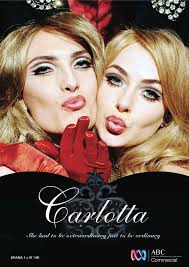
CARLOTTA
Australia, 2014, 90 minutes, Colour.
Jessica Marais, Anita Hegh, Eamon Farren, Socrates Otto, Andrew Lees, Ryan Johnson, Alex Demetriades, Caroline O’Connor?, Paul Capsis.
Directed by Samantha Lang.
Carlotta is made-for-television film about the Sydney celebrity, Richard Byron, who was the first man in Australia to undergo transgender surgery. Richard had become Carlotta, a star in drag programs, especially in Les Girls in King’s Cross.
The film was directed by Samantha Lang who made such films as The Well and Monkey’s Mask.
Many have criticised the choice of Jessica Marais to portray Carlotta, thinking it would have been better to have a male actor transformed into the famous drag queen. Not that Jessica Marie does not give a very good performance. She enters into the story and the character with great strength.
There is a very good supporting cast of Australian character actors and something of an expert re-creation of the period in Sydney, from the ordinary suburbs of Balmain to the exotic clubs of King’s Cross.
The film also shows the wariness at the time about transgender surgery, even of sons becoming drag queens, as was the case with Richard’s mother.
The film captures the spirit of the clubs, of Carlotta as a little boy, Richard, singing songs, performing, dressing in his mother’s clothes as well as his transition to working in a department store, designing windows and then the story of Carlotta.
1. A Sydney story, the 20th century? From the suburbs to King’s Cross? Transgender? Surgery?
2. The choice of an actress rather than an actor to portray Carlotta? The fine performance, her appearance as a teenage boy, adult, as transgender? Undermining the credibility of Carlotta’s experience?
3. The re-creation of the period, the look of life in those days, homes, Balmain, the little boy’s world? Department stores and windows and design? Sammy Lee, the clubs of King’s Cross? The visuals, costumes, make up? The King’s Cross world, the clients?
4. Richard Byron’s life, his age, experience, femininity, his songs and performances, dressing up, his mother’s wardrobe and make up? His mother upset? His stepfather and his brutality? The effect?
5. Richard going to the department store, meeting the two men, Danny and Christopher, their Style, Richard rather ingenuous? His delight with his work, the friends, the dressing up, going to the clubs? Richard and the transformation into Carlotta, style? Leaving home? His mother’s reaction? His stepfather glad that he was gone?
6. Keeping company with Ava and Christopher, the relationships? Going to the Sammy Lee’s clubs, Sammy and his character, his enterprise, his clients? Not favouring Carlotta? her taking Ava’ place? Success?
7. The clients, Ava and her boyfriend, his brutality, leaving her? The types, straight and gay?
8. The new club, Carlotta and her friends, persuading Sammy Lee? His introduction of Sheila, choreographer, the performances, the rehearsals, Sheila and her friendship, advice?
9. The clubs of King’s Cross? Drag clubs?
10. Ava and her strong bonding with Carlotta, the issue of transgender, Carlotta preparing for surgery, Ava not wanting it? The opportune time, going to hospital, the surgery, its consequences?
11. The performances, the competition with Peggy?
12. Carlotta’s mother, the phone calls, not having seen her son, the meeting of the Park, not able to accept Carlotta as a woman? Leaving? Yet the continued
contact? The depression and her husband leaving her? Interactions? Carlotta supplinnng the money for her mother? Her visits and their conversations?
13. Carlotta and clients, sexual encounters, behaviour, her disgust?
14. The background to the operation, application, the preparation, hormones, the surgery, Carlotta in hospital, the success, the effect on her and living like a woman?
15. Peter, at Les Girls, attracted, the relationship, the proposal, Carlotta’s acceptance? Peter taking her to meet his mother, the family, the issue of children? The wedding? The truth, Peter able to accept the truth? Carlotta staying? Her watching him with children, the decision that she should leave him so that he could find true love and have a family? The visit for the christening of the child?
16. The plan to go to the UK, the writer with Peggy, the friendship, the nature of the two, Carlotta not going, the later bonding with Peggy?
17. Carlotta, the subsequent career? A personality and celebrity in her own right?
Published in Movie Reviews
Published in
Movie Reviews
Tagged under
Saturday, 18 September 2021 19:51
Surviving Picasso
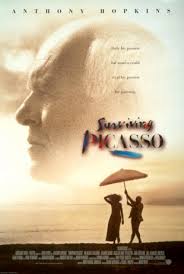
SURVIVING PICASSO
UK, 1996, 128 minutes, Colour.
Anthony Hopkins, Natascha Mc Elhone, Julianne Moore, Joss Ackland, Susannah Harker, Peter Eyre, Bob Peck, Dominic West, Jane Laportaire, Diane Venora, Joan Plowright.
Directed by James Ivory.
Not knowing much about Picasso, I found the film quite interesting. I checked with an art expert and she said that the screenplay did justice to Picasso.
The film opens during the War in occupied Paris. Picasso already has a worldwide reputation. Divorced, he has an estranged wife and child and is an unrepentant womaniser. He meets a young aspiring artist, Francoise, who becomes his mistress (but seeing herself as married to him) and the mother of Claude and Paloma. The film shows their love and the deterioration of their relationship as well as some flashbacks to show his wedding to the Russian dancer, Olga, as well as his more conventional marriage.
It is in this context of Picasso's artistic and pioneering brilliance and his macho self-absorption and use of woman that we see his genius and his deficiencies as a likeable human being. Anthony Hopkins gives another intense and distinctive performance as Picasso. Portrait of the artist as…?
1. Picasso’s reputation, his art, his influence, the film giving an opportunity to appreciate his work, his reflections, his creativity, his style? The popularity in his own day?
2. The personal story, egotistical and narcissistic, his vanity, self-questioning? The flashbacks and his relationships with women? Olga, Diaghilev, the Russian ballet, the exciting relationship, the birth of her son? His leaving? Her consequent madness, the only wife of Picasso? pursuing him? Talking to Françoise? Marie- Therese, her daughter, his visits, the payments, the gifts, at home with this family? Dora, her intensity, mistress, the gift of the house, her moods, the fight with Marie Therese as Picasso painted? His visits to Dora?
3. Picasso and his attitudes, his style, art, the art dealer, supporting him when nobody else did? Sebardes and the years of faithful service? His control over access to Picasso?
4. Picasso and self first, doing what I want, loving whom I want? The effect of his relationship with each woman? Controlling them? Françoise as controlled, his orders, the many years? The children? Paulo and his father’s disregard of him, the crash and the papier mache head, change of attitude, working with his father? Picasso as fickle? Meeting Jacqueline? The attraction, the infidelity? Her subservience and calling him mon seigneur?
5. Françoise, Genevieve, young, eager, love of art, the visit to Picasso, hurrying to his house? The attraction, Françoise as susceptible, trying to be independent? Her clashes with her father and his ousting her? The bond with her grandmother, love, the visits? Becoming pregnant, the two children? The continued love of the grandmother, her coming to visit, playing the casino, her death? Françoise and her own art? Picasso putting her down? The setting up of the studio, her being a mother, playing with the children, watching Picasso and his devotion to them? Wanting Marie- Therese to raise and her daughter to meet her son? The beach scene?
6. Her friendship with the chauffeur, with some parties, the effect? Picasso firing the chauffeur, his leaving after 25 years, his strong words to Picasso, Picasso relentless? Warning that Françoise would leave him?
7. Picasso and his interest in pottery, the work with the kiln, with Jacqueline, the painting? Françoise seeing them in the restaurant? In Paris, the meeting with her father, a reconciliation with him? The funeral, meeting Genevieve again, the bonds between the two? Françoise and her reaction, packing, taking the children, a new life? Her asking Picasso to commit to her in the church as he made her do in the church in the past?
8. The flashbacks, Olga, the ballet, the whirling social life, Picasso leaving her, her madness, pursuing him, talking to Françoise? Marie- Therese, the marriage, the daughter, his visits? Memories of Dora, her artwork, clashing with Marie- Therese?
9. The chauffeur, fired, his strong speech? Sebardes, his explaining himself to Françoise, getting meaning for life from Picasso, yet his wife, little time at home, poor salary, paying his own fares? The art dealer, his interest in Picasso, supporting him, yet Picasso mocking him? The buyer from the United States, kept waiting, allowed in, his response to the paintings, the American response to Picasso? Comparisons with Matisse?
10. The visit to Matisse, going to the chapel that he painted, issues about faith, praying and not praying, Matisse’s friendship with Picasso, the gifts?
11. The world of Picasso, France, his art, the final bullfight and Françoise leading the tribute on the horse?
12. A story of the first half of the 20th century?
Published in Movie Reviews
Published in
Movie Reviews
Tagged under
Saturday, 18 September 2021 19:51
Humingbird/ Redemption
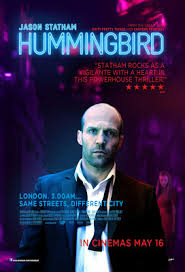
HUMMINGBIRD/REDEMPTION
UK, 2013, 100 minutes, Colour.
Jason Statham, Agnes Buzek.
Directed by Stephen Knight.
Hummingbird, also called Redemption, is something of a different star vehicle for Jason Statham. An Olympic athlete, he emerged as the star of gangster films, especially Lock, Stock, and Two Smoking Barrels. From 2000 he made a great number of films, like the Transporter series, as well as films in the UK and in the United States. Eventually, he could become the assistant to Sylvester Stallone in The Expendables films.
This film was directed by Stephen Knight, better known as a writer of such grim films as Dirty Pretty Things and Eastern Promises.
The action of the film is confined to the area around Shaftsbury Avenue in London, Soho and Chinatown. It shows the life of the people on the streets. It also shows the exploitation of women, especially by sadistic rich businessmen.
After serving in Afghanistan, with which the film opens, there are many flashbacks, Statham’s’s character, Joe, is mentally disturbed, living on the streets where he goes to a soup kitchen where food is served by a nun, Sister Cristina, played by Agnes Buzek. Connection grows between the two, especially with the investigation of the death of a young girl whose body is found in the river. She has quite an effect on him. And he has an effect on her – she also has a somewhat limited background which she explains to him which means that there is some ambiguity as to whether she will stay in the convent or not.
A different kind of Jason Statham movie – but with many of the regular ingredients.
1. A Jason Statham action film, or more? The indication of the titles? The symbols of the hummingbirds? The Sisters of Redemption? What redemption for Joe? For Cristina?
2. The London settings, the specific focus on Soho, Chinatown, Covent Garden? Night and day? Authentic feel? The contrast with the affluent apartment? The convent? Restaurants, the visit to the ballet? The musical score?
3. The opening in in Afghanistan, Joe, his role in the military, the attacks, the deaths on the transports? The accusation of the assassin? Joe accompanying him through the town, people calling out that he was innocent? The effect on Joe, mental, nightmares, continually remembering the episode?
4. Joe, his return, sleeping on the streets, mental difficulties? The two men coming into the street, attacking the street sleepers, in their cardboard boxes, the girl and her head-butting and escaping, Joe and his being bashed?
5. Joe and his being chased by the men, opening the skylight, going into the apartment? Luxurious? Fixing himself up, the shower, taking the clothes? The couple at the door, his saying that he was the owner’s boyfriend? The apartment as a base? The letters, the credit card, his taking the money?
6. Sister Cristina, from Poland, the convent and the community, the superior? The soup kitchen? Her friendship with Joe? The girls on the street? In civilian dress? Going home to the convent? Joe’s gift of money, her giving it to the superior, her being allowed to use it for something of herself, paying for the box at the ballet? Her hopes of being a ballerina? The father’s brutality, wanting her to do gymnastics, the sexual harassment by the instructor, her injury, her killing him? Being sent to the convent, to England? Her wanting to work in Africa? The friendship with Joe, his bringing her the red dress, the outings, the discussions, the information about Isabel’s death? Her going to the ballet, to Joe’s apartment, the previous kiss, telling the story, the sexual encounter? The owner returning home? The effect on her, return to the convent, still wanting to go to Africa? Yet willing to be with Joe?
7. Joe, contact with the girls, confronting the brutal men, getting the information about Max Forrester, the audience seeing him, his brutality towards the girls, sadistic, deaths? The leads? Identification, at the ballet, Joe confronting him, throwing him from the building?
8. The effect of all this on Joe, some kind of recovery, some kind of redemption, yet his decision to work for the Chinese, the interviews, the delivery of the drugs, the encounter with the seedy characters? The encounter with Cristina and its effect on him? His future?
9. Cristina, her future, staying as a nun, working in Africa?
10. The contrast between the seedy Soho, the devout life of the convent, the wealthy, the poor in the street? The mixture of action show with personal themes?
Published in Movie Reviews
Published in
Movie Reviews
Tagged under
Saturday, 18 September 2021 19:51
How to Make an American Quilt
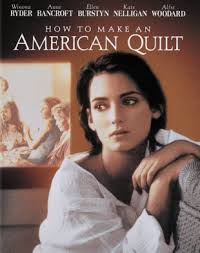
HOW TO MAKE AN AMERICAN QUILT
US, 1995, 109 minutes, Colour.
Ellen Burstyn, Anne Bancroft, Winona Ryder, Maya Angelou, Alfre Woodard, Jean Simmons, Kate Nelligan, Dermot Mulroney, Johnathan Schaech, Rip Torn, Loren Dean, Mykelty Williamson.
Directed by Jocelyn Moorhouse.
It was a surprise when Melbourne director, Jocelyn Moorhouse, (Proof) was asked to direct this very American piece. She has made a very stylish film, using her camera and lighting with great subtlety, that takes us into a particularly women's world, American style.
The project began as a thesis, research and writing by Whitney Otto - and became a best-seller. She found that the tradition of quilt-making brought women together to share their lives and feelings as they worked, communally, on quilts (with the strict rules for patterns, colours and design). The screenplay itself works as a cinematic quilt. Winona Ryder plays the young woman who comes to her grandmother's home for the summer to work out whether she loves her fiance and whether she should marry. As she listens to the women who quilt, she hears their stories. And these are presented as flashbacks which form the pieces of the quilt. Each has different texture, different emotion, different insight.
The film has a strong cast including Ellen Burstyn as the grandmother and Anne Bancroft as her sister. Standouts are the poet Maya Angelou as the woman who knows the rules of quilting and Lois Smith as the blunt and bitter Sophie.
The men are less present in the film, Rip Torn as Anne Bancroft’s husband, Loren Dean as the earnest young man who eventually abandons his wife. There were some emerging stars in the cast including Claire Danes, Samantha Matthis and Jared Leto.
The film shows us a cross-section of family lives with the sorrows and betrayals, the joys and the possibilities of love.
1. An interesting piece of Americana? Australian director and perspective?
2. The locations and times? The 1990s, the family home, the town? The flashbacks and the different times? Costumes and decor and period look? The visit to Paris? The musical score?
3. The tradition of American quilts, piecemeal, the styles of materials, designs, the patterning, the sewing? The work of the group of women? The bonds between them as they worked? Conversations, memories, humour?
4. The nature of a quilt? The screenplay and the design of this film as a quilt? The overall framework of the women working, as a gift for Finn’s wedding? The focus on Finn and her story, her encounters with all the women, their flashbacks, piecemeal, making a quilt as an enterprise for the interconnected stories?
5. At home with Hy, Finn’s grandmother, her past with her sister Glady Joe, bonds between them, their concerns about Anna and her place in the household, her pregnancy? Hy and the death of her husband, in hospital, her grief, her seeking out Arthur, his driving, the sexual encounter, the return, his estrangement from Glady Joe? Glady Joe’s anger, smashing things, making the wall? The reconciliation with her sister? Inviting her into her home, their living together – and later Glady Joe starting to dismantle the wall?
6. Glady Joe, the vivacity, relationship with her sister, her being hurt, the confrontation with her husband and his self-defence, smashing things throwing? Growing older, letting her sister live with her? Their growing old together? The two sisters and their smoking pot on the veranda?
7. Finn, her age, her absent mother and her various boyfriends, on the move, her influence on Finn distrusting men? In her relationship with Sam? The engagement? The bonds between them? Her meeting Leon, her being attracted to him, his being forward, asking her out, her talking of her engagement, kissing him, feeling that she was betraying Sam, Sam suddenly turning up, the issue of having children, the clash, his leaving? Her feelings? Leon coming by, the temptation, her resisting it and letting him go? Asking her grandmother and the other women about their attitudes towards Sam? As a student, not completing her studies, different theses, the criticisms of Sophia, her working on the thesis, ethnology, the storm and the pages all being scattered round the garden, her wanting to give up, the women collecting the pages, Sophia ironing the pages, reading them and encouraging her? The return of her mother, their frank talk, her mother wanting to get back with her husband after 20 years, Sally changing her mind, Finn not comprehending? Her leaving phone messages for Sam, his return, the bond between them?
8. Sophia, tough, blunt, straight talking to Finn? Her memories, her mother, her mother’s loose life, encouraging her daughter, her being a star diver, Preston seeing her, impressed by her, the outings, in the water, the marriage, the children? Her further ambitions being thwarted? Preston and his travels? The estrangement between the two? His trying hard, Sophia and her dominance, in the bedroom? His packing, leaving, never being seen again? Sophia and her memories, her bond with the women, the quilt? A softening of her attitude towards Finn?
9. Anna, the previous servant becoming the matriarch? Her rules for the making of quilts? Her personality, strength? Her support of Finn? Her daughter Mariana? Present at the quilt-making? Different from her mother? Anna’s memories, as a servant, in the household, her becoming pregnant, handling the situation, Hy and Glady Joe and their help? Mrs Rubens and placing Anna, the issue of the baby? Anna serving in the household, growing up with the two sisters, moving to a position of domination? Mariana, going to Paris, relationships, the glimpse of Winston, his consoling her, the love of her life but never seeing him again?
10. Em, when young, glamorous, in love with Dean, the posing, the pictures, the sensuality, his sexual response? The marriage? The years passing, his painting, his infidelities, Em living with them, forgiving him? Her never leaving the town, joining the quilt-makers? Talking? Her advice to Finn? Suspicions of Dean having an affair with Constance, her decision to leave him, her return home, sleeping on the couch, his coming to her, the reconciliation and forgiveness?
11. Constance, coming later to the town, her marriage with Howell, his illness, death, her grief? The home movies and his bond with her, love, posing, humour? The aftermath, her loneliness, the meeting with Dean, his propositioning her, inviting him in, turning him away? Her anger with the women? Her design for the quilt and the garden in memory of Howell? Her return, reconciliation?
12. Sally, love for her daughter, taking up with men, wandering around the country, the return, blunt, straightforward, the discussions with Finn, Finn being disillusioned by her mother’s attitudes, change of heart? Yet her mother supporting her?
13. This portrait of American society, past present, rich and poor, black and white, the more permissive society of the 1990s and young women struggling to find their identity, the meaning of life, the possibilities of love and commitment?
Published in Movie Reviews
Published in
Movie Reviews
Tagged under
Saturday, 18 September 2021 19:51
Ernest and Celestine
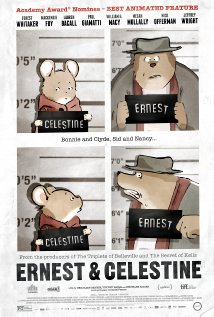
ERNEST AND CELESTINE
France, 2012, 80 minutes, Colour.
Voices of, English version: Forrest Whitaker, Mc Kenzie Foy, Lauren Bacall, Paul Giamatti. Voices of, French version: Lambert Wilson, Pauline Brunner, Anne- Marie Loop.
Directed by Stephane Aubier, Vincent Patar, Benjamin Renner.
Ernest is a bear, Celestine is a mouse. They are to central characters in a delightful French animation film, based on characters in a series of books for children. the style of animation is especially French, mild water cover, colour, muted tones, the audience supplying the full characterisation rather than the very full and explicit characterisations in most American animation films
The film opens in an orphanage presided over by a severe character, voiced in the American version by Lauren Bacall. We are shown two worlds, the above-ground world of the bears and the below ground world of the rodents. Celestine disturbs a family of bears when she appears in the bedroom of a little boy who has lost a tooth. The mouse scares the bears but is rescued by Ernest whom we have seen in his house, preparing his musical instruments and going to busk on the streets of the town. The plot concerns the happy life of Ernest and Celestine at home as well as the police searching for them for disturbing the peace.
The last part of the film has two court cases, one above ground where Celestine is being tried by the bears and below ground where Ernest is being tried by the mice. There is some humorous repartee in the court but then a fire breaks out disturbing both cases with both Ernest and Celestine coming to the rescue of the judges.
There are two versions of the film, one in the original French with Lambert Wilson as Ernest. The American version has a very strong cast led by Forrest Whitaker as Ernest and with such performers as Lauren Bacall and Paul Giamatti in supporting roles.
What else could happen except for happy ever after and the prospect of other Ernest and Celestine films.
1. A delightful story? For the family? For adults? Children’s enjoyment?
2. The French touch, sentiment, imagination?
3. The animation, the pallette, the colours, muted, the shapes, locations? The score and the songs?
4. The voices, the English-language talent?
5. The opening with the bears, Celestine and her writing stories, drawings? The supervisor bear, her voice, lights out, control over the bears, wanting to tell a story, the bear and the mouse, her reaction, Celestine and her contradictions, her questions?
6. The narration of the story, the role of the mice, the bears? Ernest, at home, large, his musical instruments, going into town, begging?
7. Celestine, in the house, the fable of the Tooth Mouse, the little bear, his parents’ stories, the appearance of Celestine, the panic, the mother on the bed,
trying to get rid of the mouse?
8. Ernest helping, taking the van, the escape, Ernest’s house, the details of their happy life, painting the van like the woods?
9. The police, the complaints, coming to arrest them? The announcements about the arrest?
10. The police coming, the confrontation, the bear police, the rodent police? The bears taking Celestine, the rodents taking Ernest?
11. The two courtrooms, the parallel trials? Ernest and his earnestness? Celestine and her defiance?
12. The judges, the touch of pomposity? The testimony, the witnesses being pressurised in their testimony?
13. The fire, the rodent judge, the fire going upstairs, Celestine putting the rug over the judge, Ernest extinguishing the fire, yet on fire himself? The reaction
of the judges? The vindication of Ernest and Celestine? Heroes?
14. The niceness of the story, the characters? The final song from Ernest?
Published in Movie Reviews
Published in
Movie Reviews
Tagged under